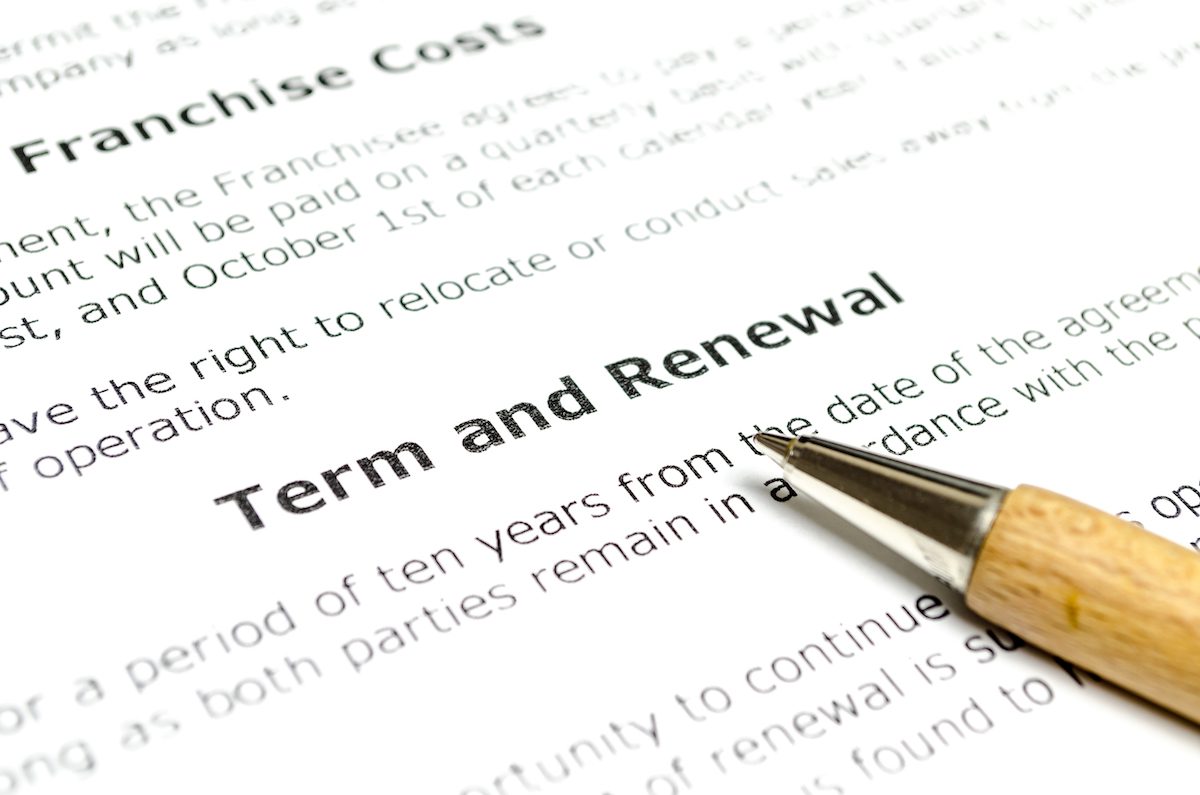Everything You Need To Include in Your Lease Renewal Letters [Template]
There's usually a lot of upfront paperwork for landlords when bringing in a new tenant. You sign a rental lease agreement only after you've reviewed an application, background check and, most likely, some additional documents.

From there, things quiet down. You may have to update records if there are maintenance requests or complaints, but otherwise, you sit tight until approaching the lease end date. That's when paperwork picks back up.
This is because it's time to decide if you want to send lease renewal letters. Not every rental property keeps tenants for more than one term. Some landlords wait for a lease to expire and bring in new tenants. Others try to keep good tenants who followed the original lease agreement.
If you're in the second group and want to renew a tenant's lease, here's what you need to do.
What is a lease agreement renewal?
A lease renewal agreement is a new contract made between a landlord and tenant, usually extending the length of their current lease. As lease agreements are about to expire, the landlord decides if they'd like to offer a lease extension. Some terms may change, but all the updated details will be part of this new agreement. The tenant decides whether they want to accept these new terms and remain in the rental.
Keeping it official is important, which is why it's a best practice to standardize this process across all your properties. Using a lease renewal agreement template can streamline your renewal letters and ensure you've got a record of all the tenants you extend this offer to as their lease end date approaches.
Why do you need a lease renewal agreement?
If you're a landlord, having a lease renewal agreement allows you to keep your high-quality tenants in place. It's your way of telling them they don't have to move out when their lease expires — you want to keep them as your current tenant.
The document is also a way to alter the terms of the lease in an official way. Renewing a lease isn't often done with the exact same terms since this is an appropriate opportunity to raise the rent.
New lease terms should include the new rent amount, as well as the length of the lease agreement. Make sure you have the start date on there and, if applicable, an end date. If you're allowing your tenant to go month-to-month, make sure to specify how many days' notice you require before they can move out. Thirty days' notice is standard in those situations but check local laws.

What should you include in a lease renewal agreement?
The specifics of a lease renewal agreement can vary depending on the situation, but there are some general items that should always be included:
- Name and property address of the tenant
- Name and contact information for the landlord
- Amount of rent for this new term, and when it's due each month
- Rental period of the new lease agreement, with a specific start and, if possible, end date
- Details on any new renewal terms or changes to the current lease agreement, such as a shift to a month-to-month lease
- A space for both the landlord and tenant to sign
Like any other lease agreement, this is a legally binding document. To protect your property, you must make sure all the vital and relevant information gets included to properly renew the lease.
If I raise the rent, what happens to the security deposit?
When preparing a lease renewal where you've added in a rent increase, you can't forget to address what happens to the tenant's deposits. This can include both a security deposit and a pre-paid last month's rent.
It's up to you to decide whether to ask for the difference in price or not, but most states require you to do it at the time the original lease expires or you can't do it at all. For example, say you want to raise the rent by $50 as part of your renewal terms. If your tenant has already paid last month's rent, you need to collect an extra $50 now to cover the difference.
As for the security deposit, if you think you need to collect the rent increase difference, go ahead, but most likely, it's money you return once the tenant moves out, so there's no real need.

How do you send a lease renewal letter?
The most important goal of a lease renewal letter is advance notice. You want to ensure your tenant receives the letter before their current lease ends, and with enough time to decide whether to stay or go.
How you deliver that letter can vary, but make sure you get confirmation the tenant received it. You can do this in a few ways, and probably should pick more than one.
- Physically mail the letter via certified mail to get a delivery confirmation
- Email the letter and ask them to reply to you that they received the document
- Drop the letter off and hand it directly to your tenant
You can also send it to your tenant and call a day or two later to get verbal confirmation they've seen the letter. This is a great way to address any questions they may have before going any further in the lease renewal process.
When should you use a lease renewal agreement?
You should use a lease renewal agreement whenever you want to renew an existing lease agreement. This document is especially useful if you want to offer a lease extension for current tenants because you're happy with them as renters.
You may even want to offer lease renewals for all good tenants before they even ask. Possibly seeing the new lease terms may inspire them to stick around.
After you send your lease renewal letters, and the tenant accepts, the next step is to prepare a new agreement and get that signed.

What to consider before sending a lease renewal letter to tenants
As you get ready to renew the lease of current tenants, it's best to have a plan that makes it easy for your renters to continue renting. Keep these key points in mind when beginning this process.
Timing is everything
Make sure you send the lease renewal letter well in advance of the current lease's expiration date to give your tenants enough notice to review it and accept it. Give them at least 30 days' notice.
Delivery method
While you have different options, make sure you pick one (or two) that aligns with how your tenant likes to communicate. If they do everything by email, go that route. Of course, certified mail always feels official and easily offers up a record of the transaction.
What to say
The devil is in the details, so be sure to include any changes to the current lease agreement. This includes such items as an increase in rent or a change in the lease term. Once the lease renewal letter is complete, make sure you keep a copy for your records. It may prove as a great template for future tenants.
Make it official
After agreeing to the terms in the letter, you'll need to draw up a new lease agreement. It's not valid until both the landlord and the tenant sign it so set a deadline for this part of the process to take place. Try to do all the signing together so you can make copies and deliver one to each of your tenants, and to yourself.
Stay on schedule
Don't forget to schedule reminders for yourself to ensure your tenants don't miss the deadline to submit the renewal. You may have to follow up with your tenants a few times after sending the lease renewal letter. This is also a great time to ensure there are no questions or concerns.
Does a landlord have to renew a lease?
As you near the end of an existing lease, even if your tenant expresses interest in staying, you do not have to renew the lease. It's totally up to you, and you need to do what's best for your rental business. That may mean taking a chance on finding new, better tenants who you are confident will pay rent on time and not damage your property.
There's no reason you have to get stuck with a sub-par tenant.
What happens if the lease expires?
If the lease expires, and you and the tenant agree it's OK for them to stay, even without a new lease, the tenant typically automatically shifts to a month-to-month agreement. Standard rules for this type of situation set a 30-day notice policy for any changes to the rental situation. That means a tenant must give you 30-days notice if they plan to move out and you have to provide 30-days notice if you intend to raise the rent or want them to vacate the property.

Lease renewal letter template
Ready to write your lease renewal letters? This template could make things faster and easier, ensuring you don't forget any important details. Download this example to use, simply update everything in brackets.
[Tenant Name]
[Property Street Address]
[Property City, State and ZIP Code]
[Date]
Dear [Tenant Name],
I'm writing to let you know that our lease agreement will be expiring on [date] and we would like to renew it for an additional [number] year/month(s). I'm also willing to set up a month-to-month lease under the terms listed below if you'd prefer it.
The terms of the new lease agreement remain unchanged, except for [mention any changes here, including an increase in rent and whether they'll need to pay out the difference on their deposits].
I would appreciate it if you could let me know by [date] whether you will renew the lease agreement. From there, we can schedule a time to sign an updated lease.
Thank you,
[Your Name]
[Your Phone Number]
[Your Email Address]
Keep lease renewal agreements official
A lease renewal agreement is an important document that helps ensure that you have the opportunity to introduce new terms to the lease while maintaining others from the original. It advances the legal relationship you've entered into with your tenant. Be sure to include all of the important details in your lease renewal letter, and send it well in advance of the current lease's expiration date to give tenants time to consider the option and let you know their decision.
